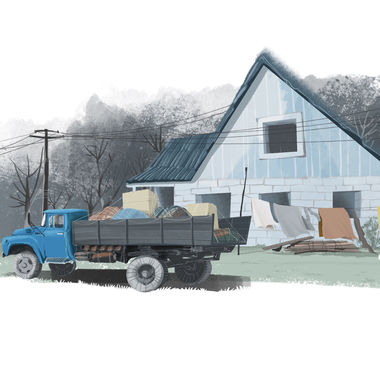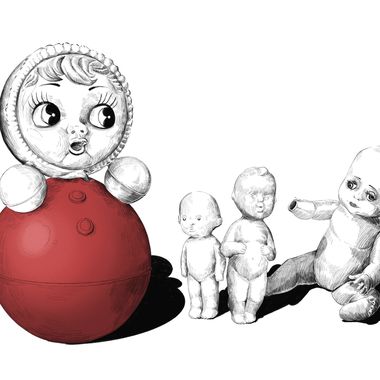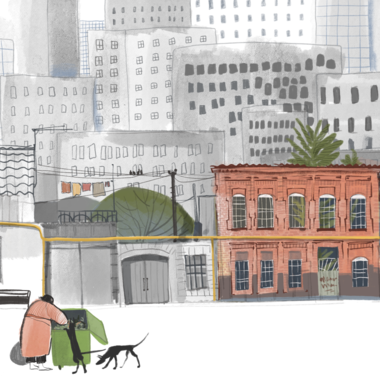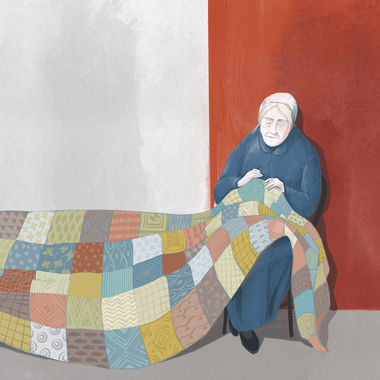1996
It is past 10 a.m. and the city, still adjusting to the ceasefire, is just waking up.
Anahit awkwardly negotiates the potholes, carrying her backpack, ghetto blaster and grammar books on loan from the local library. A month ago in Toronto, her biggest obstacle was dealing with the early morning traffic jam on the QEW.
Now, halfway around the world, in this tiny self-declared and unrecognized Republic where her ancestors lived, Anahit is trying to reassess her existence. A rather drastic move to figure this out, her mother has exclaimed many times over the phone, but here she is walking in the constant fog that protects the city hidden in the valley. As she passes by a store named “THE STORE” she notices the advertisement for toilet paper on display in the window and stops. She pensively examines the ad for a few seconds and then walks in. A few minutes later she comes out carrying twelve 3-ply rolls of the extra soft yellow Tuvalet Kagidi (Happy Clean) imported from Turkey.
Her load now doubled, she continues her way to the President’s building.
It is 10:30 a.m. and the guards in the front entrance are expecting her. Anahit and her load are hard to miss, even from a distance. Today, the girls in the office will have quite a laugh at teatime discussing the reactions of the guards watching her carry the giant bundle of toilet paper into the building. Anahit smiles and greets them by name and walks in proudly with her newly acquired trophy as they watch her in continued astonishment, not just for today but at her presence in the building in general.
Today they spare her and do not ask her why a Canadian would want to come to live here but wait for her to pass by so they can discuss the “why” among themselves. That conversation will of course end with the usual conclusion, she must be a shpion, the Russian word for a spy.
The reality is far more prosaic. Anahit wanted to be part of the newly independent country of her grandfather who fought in Sardarabad. She wanted to contribute to its betterment, but for that she needed to work. So, to be offered a job teaching English to the President of the unrecognized Republic which hoped to join the recognized Republic just six hours away was not something she could refuse. It would be an honor she was told by all, so after his initial hesitancy due to her being young and female as well as not knowing Russian, Anahit was hired.
Having escaped the two most popular questions often asked of her by the guards during these morning greetings: “It is really cold in Canada, is it not?” followed by the comparative “Is it better here or in Canada?” Anahit tackles the steps toward the third-floor office where “her girls” sit. Here where they all work together and share a small space, they have offered her solace and a place to wait until the President calls her. Her girls are the best and the kindest of women who continue to take care of and feed her since her arrival in the unrecognized Capital.
Walking down the newly renovated corridor, she enters the administrative office, and places her load on the first desk, the domain of Elmira, translator of Russian documents. Elmira, who is helping Susannah on the other side of the office with the preparations for the morning tea, looks up and smiles, exposing three gold teeth. As Susannah removes a series of mismatched cups and saucers from the man-sized safe, which also acts as a cupboard, Anahit takes off her coat and picks up the bundle, walks over and places the newly acquired toilet rolls in the safe, next to the recent revisions of Article 2.5 of the new Constitution. Almost on cue, Rita and Louda from the upstairs offices knock on the door and enter. The water begins to boil on the plita, the electric stove beside Susannah’s desk, and all is ready for tea.
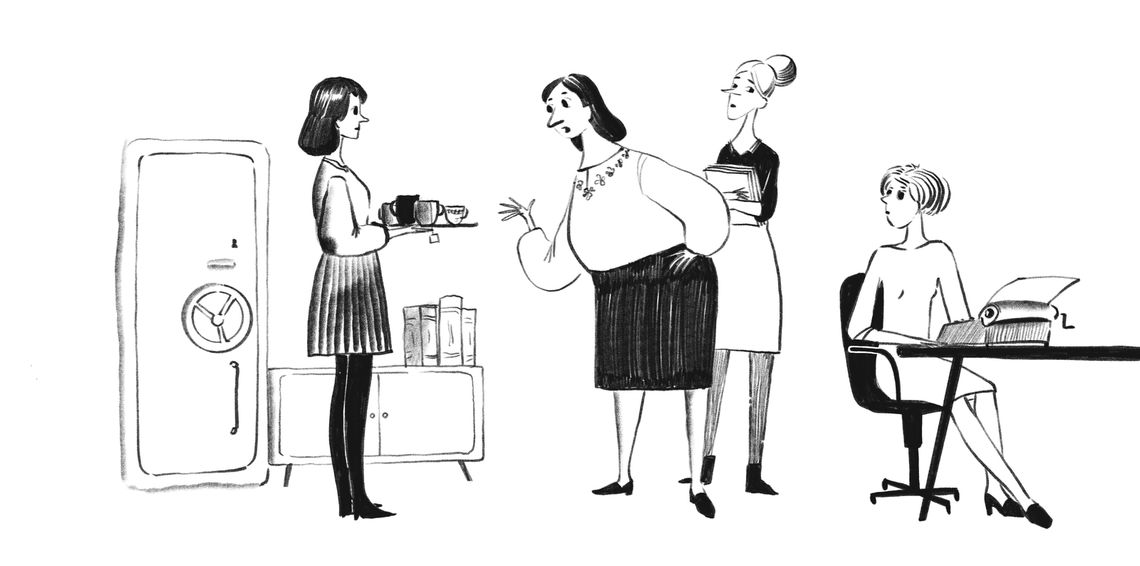
As the women sit down for their ritualistic first tea of the day, Sasha, Press Secretary extraordinaire, agitated and miserable, enters the room and without taking a breath begins to tell them what has happened as Susannah pours him a cup of tea.
“It seems the President is angry, and all because of a misunderstanding,” he says. “I forgot that we were supposed to speak only in English, he is practicing his English you see, but I forgot! And so, when he called and said ‘kamiya’ I thought he wanted to know if it was windy,” mumbles Sasha. “That’s what it sounded like to me, and so I said no. Actually I said ‘che Chef jan.’ But then he asked again, oh, I should have realized it then, but I guess I was distracted, this new Julio Iglesias tape Anahit gave me, I love his… oh I am digressing, so he yells, ‘kamiya, kamiya’ and I opened the window and checked the clouds, all was clear, there was no wind and no dark clouds, so I said, ‘no, kami chika’ and then he starts yelling at me to get over there, this time not in English! How was I supposed to know he was speaking English, ‘come here’ that’s what he was saying, ‘come here,’ can you believe it?”
Susanna hands Sasha the cup she has poured for him and sits down. She then unwraps the Derby Turkish chocolate bar, breaks a piece and picks up her cup. The women really want to laugh but being part of the President’s staff and in the building where the offices of the President are housed makes it seem inappropriate, and so instead they all start drinking tea, waiting for Sasha to leave.
After gulping down his tea and lighting a cigarette, Sasha launches into another monologue about the past, and the sweet days before the war in the far away city that no longer welcomes him. Louda, who knows Sasha best, usually manages to stop him before one of his great lectures begins but today even she decides to let him ramble on for a while. Complaining about “this forsaken and unrecognized country” always seems to calm him down and usually signals the end of the rant but before he can finish, Aramazd, the head of the Office of the President enters and tells Sasha that Inkn wants to see him. Hearing the word Inkn makes Anahit smile, for until recently, Anahit heard “Inca'' as in the pre-Columbian civilization in the Andes, every time they said Inkn and thought it was a nickname for the President. She had only just figured out that Inkn meant HIMSELF, for no one in the building referred to the President by name, just HIMSELF, a knowledge shared by all except her. After the revelation, she still thinks Inca is a better choice and enjoys her own private joke when referring to the President as “THE INCA.”
With Sasha finally gone, the women no longer have to hold their humor in check. They allow for a moment of unadulterated laughter and then resume their usual teatime conversation. The exchange invariably leads to the topic of the women’s washroom. Anahit begins with one of her favorite points of contention, the injustice and discrimination against women as reflected in the unfinished and unkept women’s washroom in the President’s building, a symbolic microcosm of what is wrong with their world.
“How can we be expected to do our business without any light! Without any toilet seat! In a room without any windows!” she exclaims. Susannah, a cynic at heart, responds, “They probably think that modest women like me never go!” Elmira shakes her head and remains silent, partially because she still doesn’t understand Anahit’s dialect unlike the other girls and also because the topic makes her uneasy. Elmira, a refugee of the war and Armineh, the youngest member who has recently joined their staff, listen and look embarrassed as Louda giggles and says, “Oh Anahit, bring out the list. Let us go over our wish list again.” Elmira understands this word and smiles, flashing her gold teeth all straight in a row, for though she mainly speaks Russian, it has become part of her active vocabulary ever since Anahit taught them about making lists.
First, they made a list of all the office supplies they needed, then came the ideas about all the renovations and rebuilding they imagine for their homes now that the bombing and shelling has stopped. Setting things down has become a chronicle of their aspirations, a way to regain control over tiny aspects of their lives. Crossing off items has brought great satisfaction as well and so it has become part of the tea drinking ritual. The week before, they had started a wish list for the women’s washroom, about all the things they would like to ask for but feel too embarrassed and ashamed (amot eh) to bring up. After reading the list and adding locks for the two doors, a mirror and a sign, they all go back to work.
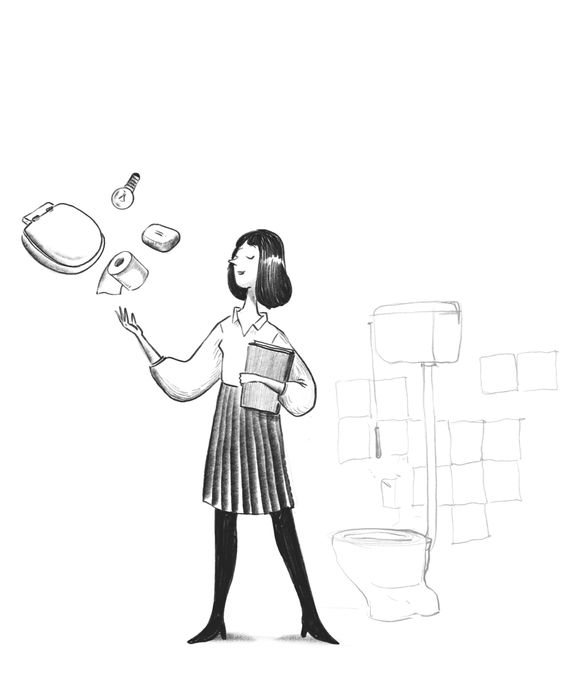
Three hours later, Anahit emerges hurriedly out of the President’s office, having finished with the day’s English lesson, no longer able to hold the five cups of tea she had consumed earlier. As she enters the hallway she notices that none of the bodyguards are present. She pauses in front of the men’s washroom, surveys both ends of the hallway and makes the decision to enter the forbidden domain of the male cultus.
The spacious latrina interior is warm and brightly lit; there is a peculiar smell in the air, lavender she thinks. She walks over to the washbasins, smells the violet-colored soap and furrows her brow at this unexpected luxury, Yardley no less. She examines her reflection in the wall-sized mirror sticking her tongue out and then notices the two bottles of cologne next to a vase of dusty red plastic carnations on the counter. She picks up one of the bottles and sniffs it. It’s the outdated and unmistakable odor of Azzaro, a smell associated with her childhood in Iran before immigrating to Canada.
Then she notices the carefully creased towel hanging on the rack and feels its softness. She turns on the tap, and to her further dismay, realizes that the men’s washroom has hot running water. She holds her hands under the water for a few seconds and then shakes her head at her own reflection and says out loud, “They and their honorable guests… enjoying themselves in this plush facility while me and my girls settle for a dark closet without a seat.” She dries her hands on her skirt, refusing to be complicit by using the towel, and in a trance, walks into one of the toilet stalls to further inspect the facilities. She notices the soft, scented toilet paper and stares at the hot pink cushy toilet seat, the kind that makes a hissing sound as you sit on it. In disbelief and overcome by a sense of betrayal and outrage, she turns and runs out of the gaudy toilette.
Dejected, she heads towards the women’s washroom. She opens the door and enters. Realizing she is without toilet paper, she rips a page from the back of the President’s writing journal, which contains his homework assignment, and enters the lightless, windowless cubicle. Leaving the door slightly ajar so as not to be in total darkness, Anahit squats over the seatless toilet and with one hand holding the door handle in case someone enters, starts to pee.
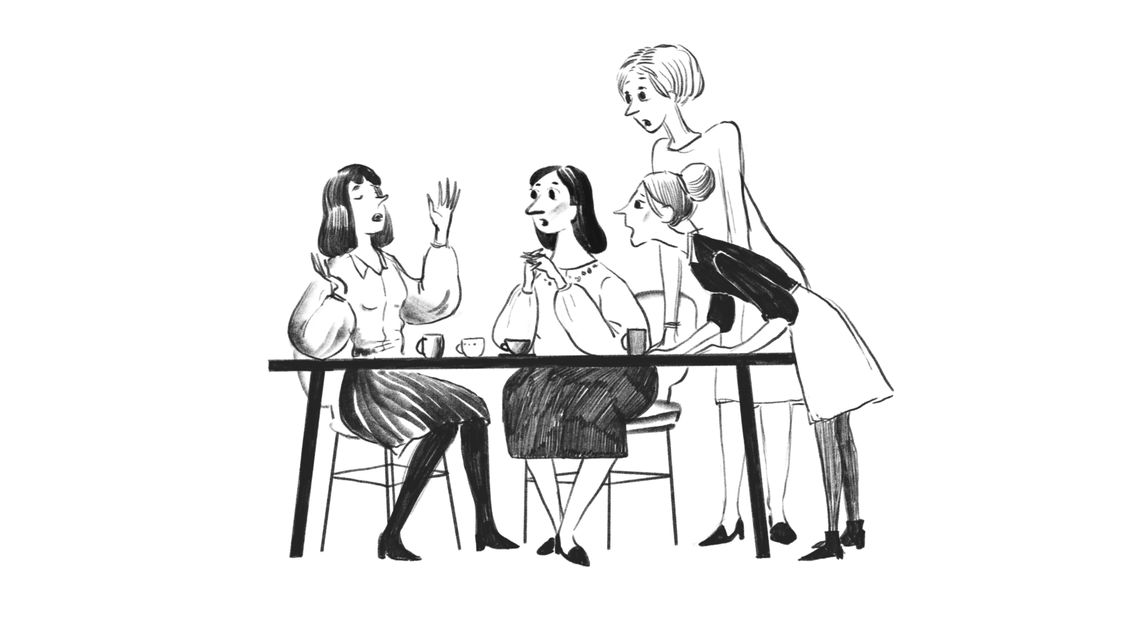
Back in the office, during afternoon tea, Anahit tells the women about her visit to the men’s washroom. The women’s reactions are in keeping with their various characters: Susannah shakes her head in horror, Louda simply turns red, Rita bursts into laughter, while Elmira smiles and covers her teeth with her hand, Armineh just looks aghast.
As Anahit pauses to drink her tea, the women reflect on this recent discovery.
They seem to be most intrigued by the color of the toilet seat. Susannah begins thinking out loud, “I wish we could have a pink toilet seat in our washroom,” and then turns to Anahit and says, “Can we add a pink seat to our list?” Taking a revolutionary posture, Anahit bangs her fist on the table and says, “Not pink, hot pink! It makes me so angry. How could all these men who have been renovating this building not even consider the women who work here? If anyone needs a toilet seat, it is us!” At this, everyone laughs and Louda says, “Oh Anahit, only you can say such things and get away with it. We can’t. I can’t believe we are even discussing it now.”
Meanwhile, having drunk her eighth cup of tea, Elmira walks over to the safe, opens it and takes out two squares of Tuvalet Kagidi, folds and sticks them up her sleeve as she leaves the room. Watching Elmira and knowing the indignity awaiting her in the women’s washroom Anahit decides that it is time to act. She gets up and declares, “I am going to have a talk with Aramazd about this.” The women, realizing what is happening, become agitated. They are embarrassed and at the same time afraid and beseech her not to go. They feel talking about toilet seats and personal needs is an inappropriate topic to discuss with Aramazd. What if he gets mad, what if he fires them, what if he thinks they put Anahit up to this? Even Armineh, who usually does not get involved, feels obliged to speak. “Oh Anahit, do not go, it is ok, we can manage,” but it is too late, for Anahit has already left. Susannah mumbles something about, “Nothing good will come of this,” and starts clearing the teacups from the table.
Anahit walks straight to Aramazd’s office and knocks before she can change her mind. “Come in, come in,” comes Aramazd’s soft voice. She walks in, sits down as directed and tells Aramazd that she wants to talk about a pressing problem. Aramazd, clearly uneasy, puts his pen down and waits. Anahit does not ease into the topic but blurts out the fact that the women require a toilet seat. As she goes on about their toilet needs, Aramazd’s color starts to change and his cheeks become pink to a point that even Anahit, fully engaged in her complaint, notices. After a few more minutes of pure ranting, Anahit sees how embarrassing this entire conversation has been for Aramazd and tones down her monologue. She tries to explain how the men’s washroom represents a betrayal of the women. After all, the women fought side by side with the men and contributed equally throughout the war years.
“How could you not think about these women? Susannah is raising two young girls on her own and taking care of her parents and mother-in-law. Did you know that her husband died on the day that the war ended? Her brothers left for Russia, but she stayed. Doesn’t she deserve the same consideration as the men in this building? And what about Elmira, she has no running water in her house, her husband abandoned her and their children, after she was forced to leave her life in what is now the enemy’s Capital, doesn’t she have the right to enjoy at least the basic comforts at work?” Aramazd, finally getting a chance to speak, tries to explain that it is not a male thing but rather an otar or an outsider thing. He says that they fixed up the visitor’s washroom to receive all the dignitaries and foreign mediators who have been trying to help them resolve the conflict in the region.
“Do you think I ever get to go there myself?” he exclaims. “We wanted to create an atmosphere of familiarity and comfort, which these people from the ‘West’ are used to. That washroom is for them!” Anahit listens in silence but her demeanor clearly shows what she really thinks of Aramazd’s justification. After a few seconds she asks, “Are you telling me that there have never been any women among all those dignitaries and representatives from the various countries? What about that Lady or Dame or whatever her title is, from the British House of Lords? Where did she go when she had to? Don’t tell me you sent her to our washroom? And what do you mean people in ‘the West’? Are you suggesting that men from ‘the West’ require 70s perfumes, fake flowers and cushy pink toilet seats?” Realizing his defeat in the face of Anahit’s relentless counterarguments, Aramazd apologizes profusely, anything to stop this conversation, and reassures her that he will order a toilet seat for the women’s washroom.
Grasping the significance of what is happening, Anahit seizes the moment and begins to recite additional items from their list. She demands a light bulb for the toilet cubicle, soap, toilet paper, and proper locks on the doors. Aramazd listens, nodding his head in agreement and promises to take care of the light and the lock expediently and upon Anahit's insistence, makes the phone call, on the spot, to the Office of the Permanent Representative in the Capital recognized by all except Pakistan and orders a white but not padded toilet seat to be sent with the next driver delivering any official pouch. After all that, Anahit finally and gracefully thanks Aramazd and walks out with a sense of triumph that makes her wonder if this is how capturing the fortress in the principality of Varanda felt.
The following morning, carrying her usual hundred-kilo backpack and ghetto blaster, Anahit is greeted by Susannah, Elmira and Armineh outside the third-floor women’s washroom. No one says a word, but Susannah opens the door and beckons her inside. As she enters the washroom, she notices the newly unwrapped soap bar near the washbasin, which on closer inspection is revealed to be imported from Iran. Susannah then opens the door to the cubicle where the toilet or the unitaz is housed; she turns around, looks at Anahit and switches on the light. Everyone exclaims, and Elmira smiles openly, as the cubicle is lit like a Christmas tree. The joy and excitement of the women standing in front of her reassure Anahit that she did the right thing voicing their demands to Aramazd. This was a necessary fight, a mini-coup, a revolutionary act of standing one’s ground, and she vows to make sure all the needs of these heroic women who have sacrificed so much are met. While Anahit is contemplating her humble role in all this, lost in a silent soliloquy, the women working in the Office of the President begin to march out of the washroom with cheers and laughter, heading for their mid-morning tea break.
While the women of the third floor are waiting for the water to boil, Rita and Louda enter, excited and wanting to see the toilet. Armineh and Anahit accompany them to the washroom and amid the oohs and ahs, Rita says, “Now that Anahit has solved the third floor washroom problems, she needs to move on to the fourth floor!” Armineh replies, “Not so fast, we are still waiting for the most important item to arrive from the Capital.” As the women laugh and talk among themselves, down the corridor, the kettle begins to boil.
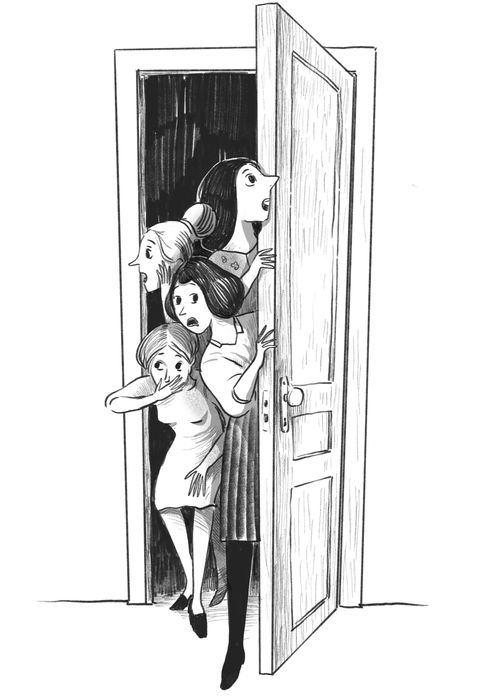
The week passes quickly for Anahit because she gets to accompany the President to the “neighboring” recognized Republic whenever he has meetings. Working on his English is a priority for the President so whenever he leaves his unrecognized country, Anahit goes with HIMSELF to continue their lessons.
A few days after Anahit returns and while climbing the steps to the office, she notices a young man on the stairs in front of her carrying two white toilet seats in pristine packaging complete with handles. She quickly runs past the confused young man and down the corridor bursting into the office, shouting that the toilet seat has arrived. But before Susannah has time to put her teacup down, Anahit has already left the room and is now in Aramazd’s office telling him the news. Ararmazd nods shyly, turning red to match the color of his tie and tries to calm Anahit who is beaming with excitement.
The following day there is a crowd gathered by the ladies washroom on the third floor. Even some of the women from other floors have come for the ceremonial launching of the toilet seat. When Anahit arrives, they all enter the washroom. When Elmira switches on the light, Anahit and her colleagues see the toilet seat for the first time. The small German flag still attached to the front of the lid reassures everyone that their seat is of good quality. This is when Susannah utters, “Now we can all go back and have more tea without worry,” and they all laugh and arm in arm come out of their lovely washroom and shout, “Anahit for President!”
That day many women visit the third floor washroom, not to use but rather to look. They even come from the Parliament and the Government buildings located in the square. The computer girls come and bring Snickers chocolate bars, the photocopy girls come and bring apples, even Sasha comes and brings flowers, and his flowers are real. Even though Susannah feels getting flowers to mark the installment of the toilet seat is a bit inappropriate it does not stop her from displaying them in the washroom. The news of the toilet seat spreads, and Anahit is invited to the various departments for tea. That day alone Anahit drinks seventeen cups of tea and tells her story about her visit to the men’s washroom about fifteen times.
The next three weeks go by quickly without much drama. The women settle into their new routine, though the good toilet paper is still kept in the safe. The only incident of note is catching Grisha, the President’s driver and his sidekick Raffik, one of the couriers who Anahit refers to as the “noxudi” or the chickpea, in their washroom using the facilities as their own private smoking room. This invasion ends with a sign placed on the door that specifically states: Women Only. So, it is very surprising when Anahit enters the office one cold November morning to be greeted with sullen faces who ask if she has been to the washroom. “Why what’s happened?” Anahit cries, and Susannah, with her usual, “humph” followed by the rolling of the eyes, states that the toilet seat has disappeared. “What? Gone? Where? Who has stolen our toilet seat?” shouts Anahit. “This is unacceptable, I am going to see Aramazd!” and with that, first rushing to check the toilet with her own eyes, runs towards Aramazd’s office and knocks. She waits until she hears him say “Come in” and then opens the door, walks in and sits down. Aramazd is expecting her but does not say so. Anahit does not waste any time with greetings but jumps straight to the point informing him of the seat’s disappearance. Aramazd can see that Anahit is truly upset. “This is preposterous, who would steal the toilet seat from the women’s washroom in the President’s building?” she asks. Aramazd, who has been waiting quietly, tells her that he has authorized the removal of the toilet seat. They sit and look at each other. This time Anahit does not speak. She is also waiting. After a few excruciating minutes of silence, Aramazd realizes that Anahit is not going away without an explanation. He takes a deep breath and tells her everything.
The story begins to unfold. It so happens that the day before, in the late afternoon, the President had a mishap in his private washroom. Apparently, a renegade wasp had disturbed HIMSELF, aka INKN, and in an attempt to swat the creature he had fallen and hit his head on the toilet seat, cracking it. The seat that is. Aramazd, his speech well-rehearsed, tries to justify. “We cannot have a President without a seat,” he says. “You must understand, Anahit. So, naturally, we had to take the seat from the women’s washroom and re-install it onto the President’s toilet. If anyone is to have a seat it should be INKN. You must understand, Anahit,” he repeats. He then pauses and waits for some acknowledgement. Holding her ground, in an attempt to reclaim their seat, Anahit asks, “Why didn’t you take one of the toilet seats from the men’s washroom? Why ours?” Aramazd, blushing, replies, “You don’t expect INKN to sit on a pink toilet seat, do you?” At this point, Anahit retreats. She turns to leave, but when Aramazd makes the mistake of promising to return their toilet seat once they get a new one for the Inca, she turns around, advances towards Aramazd and says in a controlled voice, “That is unacceptable, we do not want that toilet seat back, INKN can keep it! We want another one, a new, unused toilet seat, white of course.”
“Of course,” says Aramazd, realizing that they have come to some sort of truce, asks Anahit not to share the president’s mishap with the others. As she is about to leave the room again, Anahit has a sudden flashback. She turns to Aramazd and says, “Correct me if I’m wrong, but didn’t we get two new toilet seats? That boy was carrying two, I am sure of this. What happened to the other one?”
After a moment of silence, Aramazd looks up sheepishly and then quickly lowering his head, with his hands on the table in front of him, says, “Well, you see, um, I, um, I… I took the other seat home.” Another period of silence follows as Anahit takes in the implications of what she has been told. Aramazd’s admission changes everything, giving her the ammunition she needs. “I see,” she says with a steely look. Aramazd accepts defeat and agrees to get the new seat within a week. Once again, Anahit waits as he calls the Office of the Representative and orders it. Satisfied, she offers her hand to Aramazd who carefully takes it. They shake, sealing their implicit treaty. Anahit walks down the corridor toward the office where five women are waiting for her with tea.
The next day, during the President’s lesson, Anahit tries not to stare at the band-aid on the Inca’s forehead. Instead, she turns her attention to page 199 of Swan’s Practical English Usage and asks him to explain the difference between farther and further.
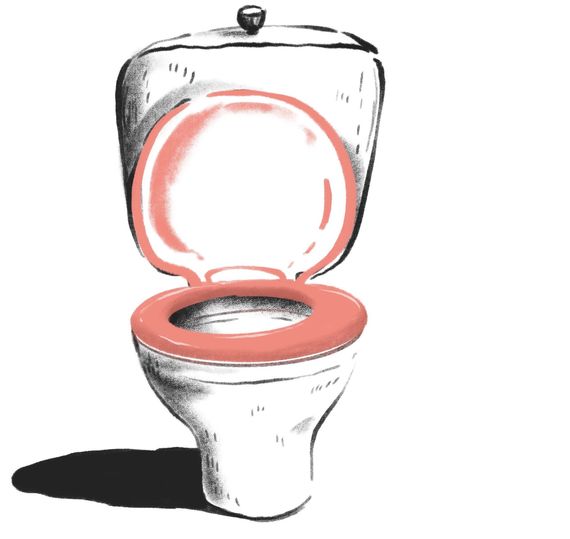
Illustrations by Harut Tumaghyan.
Epilogue
The new toilet seat came within a week, as Aramazd had promised, though it was not the same quality as the first one. This one was made in Turkey. The women at the office were content that the basics, necessary to work in the building, had finally been established. In the next few months, all the women’s washrooms in the President’s building were upgraded, seats and lighting installed. During one of her visits to the Capital of the recognized Republic, Anahit bought a mirror and a wall mounted soap dish for their washroom and Zavkhos Robert, the head of the janitorial staff at the President’s building, installed them.
Much has changed since those early days after the ceasefire. Rita, Louda, Susannah and Elmira are still working at the President’s building. Armineh got married and now teaches mathematics at a local high school. Sasha passed away a while back though his stories live on and are often shared during the ritual tea sessions especially when Anahit comes for her yearly visit from the recognized Republic where she works with battered women at a support center. Anahit is still trying to help women regain their independence and learn not to settle for less than what they deserve. Her readiness to battle injustice has led her to some victories and a few defeats throughout the years. Though many have come and gone and benefitted from the washroom upgrades, they do so without realizing the efforts that went into securing their comfort. Most people do not even remember that there was a time when the women did not have a seat.
After the Epilogue
2021
Once again people have adjusted to this most recent ceasefire. Anahit has arrived for a visit before the upcoming election. As she climbs the steps she realizes not much has changed. She walks down the third-floor corridor and stops in front of the washroom, turns the knob and walks in. The mirror is there though it has a crack on the side. No soap in the dish but the lights seem to work though one flickers at times. The washroom feels old, neglected and dilapidated. The once white walls are gray and many of the tiles have cracks in them. Throughout the years the women have settled for less and less and now only the minimum remains. The replacement toilet seat is still there, a sad reminder of a faded, long-forgotten victory. Anahit feels tired and defeated. This recent war has exposed the truth, it is not just the washrooms that have not been upgraded or renovated for the last 25 years but the entire system. Anahit realizes the possibilities that the future had offered back in 1996 no longer exist. Back then in the busy office with her girls, hope for recognition and peace were conceivable. But this recent war and the continuing fight for power and a seat have once again left these women without. The illusion has burst and Rita, Louda, Susannah, Elmira and Armineh no longer have the luxury of making lists.
Anahit walks out of the washroom and strolls towards Susannah’s office. These days the women no longer gather for tea. After spending a few minutes with Susannah and her girls planning for an evening stroll through the shelled city, she picks up her backpack and quietly walks out into the third-floor corridor of the President’s building.
In cooperation with Goethe-Zentrum Eriwan
Not a True Story But a Real Story
Chez moi
By Lusine Hovhannesyan
In this new essay for the “True But Not Real” creative writing series, writer and journalist Lusine Hovhannisyan explores the love Armenians have for their homes especially in the context of the recent war in Artsakh: “We love our houses with the skill of a person who has lost their home.”
The Summer of Chomalag
By Lusine Kharatyan
Chomalag, which means epidemic in one of the dialects of the Gegharkunik region of Armenia delves into the suspended lives of people in times of an epidemic.
The Peephole
By Karen Avetisyan
A peephole view into the kaleidoscopic distortions of other people’s lives where human interaction is set in ways foreign to you and distant from you yet in your city where the “hero” is your friend. A true, but not a real story from the ninth floor, in building 9a, in the Ninth District, the door without the peephole.
Zarmanazan
By Gevorg Ter-Gabrielyan
This is neither a true story nor a real story. But it could be either if fate ever stepped in to deliver a surprising lesson on toxic masculinity.
Homekeeping
By Armen of Armenia (Ohanyan)
"Not a True Story But a Real Story" series is a reflection on individual transformations of collective identity and the concept of home. Armen of Armenia (Ohanyan) ponders why “housecat-like Armenians” didn’t just sit tight within their four walls when they could have become “heroes” by simply staying home.
The Quilted Refuge
By Vigen Galstyan
A story weaving together the fragments of a woman’s life who organized the chaos of reality into a sensible and livable realm offhandedly called “home” but no one recognized it until she was gone.


